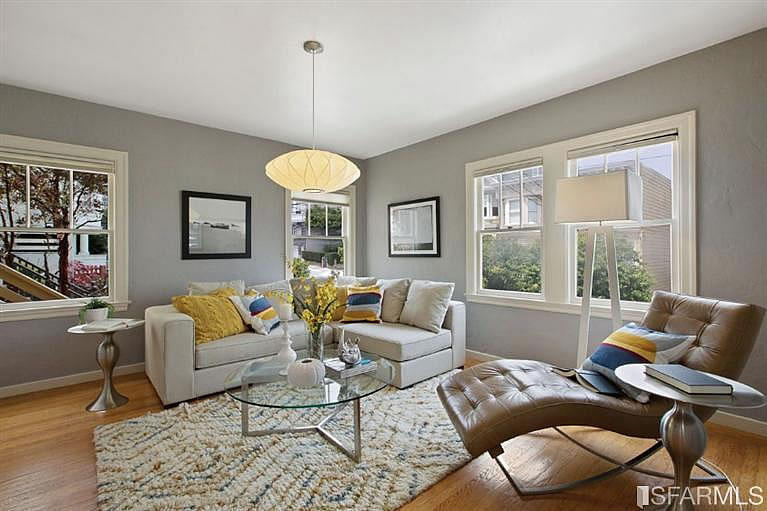Price reductions for listed homes on the market in San Francisco are more common today than they were a year ago, with roughly 15 percent of the current listings on the MLS having experienced at least one price cut versus roughly 10 percent of the listings at the same time last year.
Keep in mind that our counts don’t include listings that were reduced and then withdrawn from the market without a reported sale, such as the designer Russian Hill one-bedroom at 2222 Hyde Street which was withdrawn from the MLS yesterday.
One of the listings which is included in our count is the two-bedroom at 4207 25th Street pictured above.
Purchased for $785,000 in June of 2006, the remodeled Noe Valley condo on 25th returned to the market listed for $899,000 last month, a sale at which would have represented total appreciation of 15 percent on an apples-to-apples basis, or roughly 1.5 percent per year. The list price for the condo, which includes a deeded parking space, was reduced to $799,000 this past Friday.





Same lesson as the last bubble.
Prices cannot outpace incomes for long.
I don’t know what the deal is with this place, but it does not appear to be a harbinger of any trend. Places, even small, mediocre places, are selling for truly outrageously high prices, and selling very quickly. There are very, very few price reductions. There is plenty of buyer cash/income fueling these purchases (i.e. it is not OPM like last time around.)
That people are paying these prices is bizarre to me, I admit. And the appreciation rate must one day end. But I would not bet against it happening any time soon. Not in the next year or more. Kudos to the ed. for looking at everything very carefully to try to spot something indicating a top – I don’t see it yet, but the ed. probably will see it before I do.
I’m finally financially ready to buy, but there is no way I’m paying these prices. I’ll wait for them to drop, and if they don’t, I will find something else to do with my money! I’m already making plans for that. I guess a lot of people have plenty of cash on hand and they can handle these crazy prices.
Agreed that one place isn’t a trend, but the YOY increase in price reductions is a trend. And does that even count the removed and resisted lower places that show up again with 1 DOM?
it’s smelling very bubbly, frothy at least
I think this is just a temporary glitch in the market, when the weather starts warming up and becoming sunnier prices will rise again. I did notice our own property was trending lower on RE value estimates, but again, I think this is all a temporary glitch and the weather warming up slightly with sunnier days will again see home & condo values rising.
– sunnier days
– warmer weather
– San Francisco in the summer
What do the first two have to do with the third????? ABSOULTELY NOTHING. Get your parka’s out. It’s summer time in the city
Not in the Mission ! You don’t need parkas there. But that is funny!
I wouldn’t be surprised if prices start to stabilize, and that is what this price reduction trend in essence is showing. People that are up pricing their homes from 3-6 months ago are discovering that appreciation may be slowing down. Doesn’t mean we’re going to drop in values, but possibly flatline for awhile. This is going to be neighborhood specific also.
I notice this with rents too…stabilizing. Can’t automatically tack on a 5-10% rent increase from last year. Fair amount of inventory out there now, and all the new rental constructs coming online…I’m expecting flat rents for awhile.
Nowwwww….if tech takes a stumble. Say VC spending starts to slow down, interest rates start bumping up, a few tech high fliers start to falter….weeellllll, that could lead to a bit of a correction. On rents and home prices. At least it will make for interesting observations and speculations for the remainder of the year 🙂
do you remember last week when prices were at an all time high? yeah? that.
Each current price estimate can be based only on the properties which have recently sold. Of course these are not comparable to those that sold a year ago etc. The trend is that new construction and high end multimillion properties keep skewing the numbers up, while there are fewer and fewer fixer deals etc. Without large new hirings basically everyone who is here is already housed and staying put due to lack of options plus hanging on to the prop 13 or rent control deal.
Those IPOs better pop soon the window is obviously closing … Salaries are no longer rising and it looks like the job market is close to saturated. In parallel there is global weakness so overall Less and less to feed bidding wars.
“Without large new hirings basically everyone who is here is already housed and staying put due to lack of options plus hanging on to the prop 13 or rent control deal”
A great many millennials with jobs are housed in overcrowded situations, actually. Do you even live in SF? I’ve noticed your sweeping statements to be quite off. The other day it was “everyone is afraid of being evicted.”
30 year fixed rates are trending up, increasing costs for buyers who cannot afford to pay with cash. The Chinese economy is also starting to soften up. Due to the nature of the business (relying on comps, irrational bidding, high value/low volume commodity) I would not expect to see effects in the marketplace until next spring though.
I’m also seeing prices being adjusted up on some units, especially 1 bedrooms. There are a lot more 2 bedrooms on the market vs. 1 bedrooms, could that be part of the equation?
Like this notorious 2200 Market Unit 504, relisted last Friday for $999K after being listed / pulled / listed / pulled at the $850K / $899K mark.
Price reductions always happen the week after Memorial Day. This year is no different.
[Editor’s Note: Keep in mind that the comparison above is year-over-year, not week-over-week. And over the past eight years, the percentage of listed properties in San Francisco with a price reduction has increased an average of 0.03 percentage points the week after Memorial Day.]
Listings with price drops have increased from 10% to 15%. What is absolute number of the 5% change? (How many additional listings?) 20? 50? 200?
Another anecdotal is that as prices rise you get more people testing the market by throwing their prop out there at a ridiculous price, to see if anyone will bite.
That’s a quick way of making enemies with the Realtors. Staging, 1-2 weekends of open houses, and responding to offers all take time. I think very few listings are just testing waters as delisting is costly to seller’s reputation.
“delisting is costly to seller’s reputation” In what way? Sellers won’t be able to find another realtor to stand around for a couple of hours on two weekends and pass out handouts for 5-6 figure payout?
The currently in vogue “auction” model for pricing properties–putting them on the market at 10%-25% below FMV as suggested by comps–is clearly in the realtor’s best interest, but not so clearly in the seller’s.
The economist Steven Levitt did a study a few years ago and found that properties owned by the listing agent spent more time on the market (and sold for higher prices) than properties that the listing agent did not own. The upshot seems to be, if you get 95% of the gain from a marginally higher sale price, it’s worth listing at a higher price and letting the property sit longer; if you get only 5-6% of the gain, i.e., a commission, it’s more profitable to go for the quick sale.
Correct, which is why inferring anything about the state of the market based on list vs. selling vs. price changes is fraught with logical peril. Here’s a house that sold near me recently: 423 31st Avenue.
I just got a postcard from the listing agent trumpeting her success after selling the house for 41% over ask (!) (1.762 trade vs 1.249 ask) Woo hoo. How do the seller know they didn’t leave 150K on the table? They sold a beautiful house for $700 a foot in a great neighborhood.
Troll pricing like this skews any list price analysis (and yes, I know there was troll pricing last year too).
At some point we get from Freakonomics into a lapse of fiduciary responsibility.
What if your stock broker said, “Let’s just price your IBM shares for sale at 75% of what we think they’re worth and see where this thing lands!” Why do people let that go on with their houses?
Hey Editor, are there any good sales inventory sources of data to look at year-over-year inventory as well as month-to-month inventory? SS publishes inventory info every so often and I would love to see more of it as I think that will be the true foreshadowing of what is to come.
this site is always “over asking is nonsense” at the same time it’s “gee could these price reductions be a trend.” why? two sides of the same coin.
Not really. Over asking indicates under pricing which could have been intentional. A price reduction probably means that the seller misjudged the market. And if the seller was shooting for an underpriced bidding war that didn’t materialize, resulting in a price reduction then well, holy smokes !
flatly saying “over asking indicates” dah dah dah is not very valid, for obvious reasons. Here’s one. It’s priced at what you think is right. At the top of the market, a great house in a great market. And it still goes over asking.
Sometimes. And other times it goes over asking because it was intentionally underpriced. Are you really denying that?
no, of course I am not denying that. that sometimes occurs. as does a seller who sees a lot of big ticket sales, and prices his or her house near those marks. only to find that his/her property is not capable of commanding those figures. So again, my point stands, and that is two sides of the same coin, so why trumpet price reduction and dismiss over asking? doing so is writing a narrative, not reportage.
Except the outcome of one is intentional and the other is not. (Guess which is which.)
I agree the % of reductions from listing price is largely irrelevant without context.
Like % of over asking, they can be altered drastically by changing trends in the :asking price game”. For example, a shift to higher list prices, away from the list price it low game, would lead to this.
In other cities, this stat would have much more meaning, In SF, like the % over asking, it indicates little, especialy when other stats hardly point to a weakening market. Prices are currently rising.
I check on my place on zillow daily, and the zestimate every day goes up up up. I do think the warming up/sunny trend is good for RE & right now it’s happening.
UPDATE: Reduced from $899,000 to $799,000 at the end of May, the sale of 4207 25th Street has just closed escrow with a reported contract price of…$950,000.
Purchased for $785,000 in June 2006, the sale represents total appreciation of 21 percent for the remodeled Noe Valley condo with parking, or roughly 2.1 percent per year.